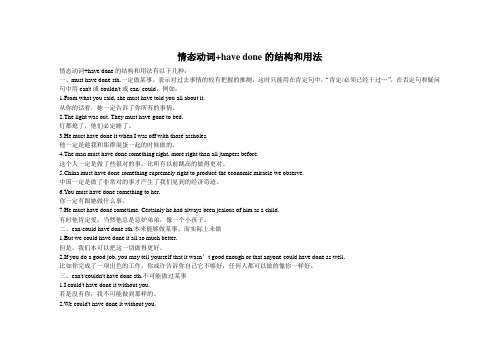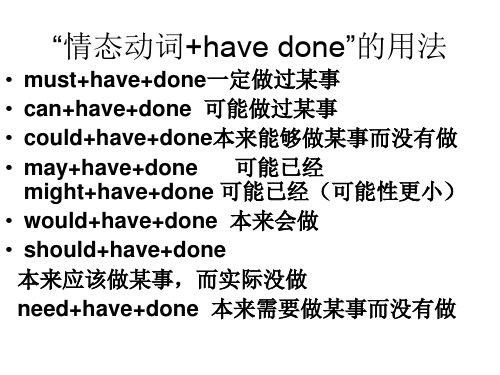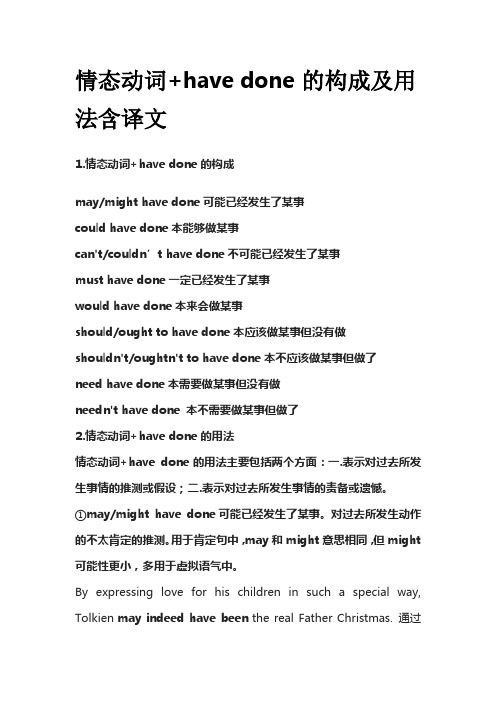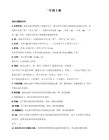情态动词+have_done_结构
情态动词 have done难点突破 (2)

情态动词+have done的结构和用法情态动词+have done的结构和用法有以下几种:一、must have done sth.一定做某事。
表示对过去事情的较有把握的推测,这时只能用在肯定句中,“肯定/必须已经干过…”,在否定句和疑问句中用can't或couldn't或can/ could,例如:1.From what you said, she must have told you all about it.从你的话看,她一定告诉了你所有的事情。
2.The light was out. They must have gone to bed.灯都熄了,他们必定睡了。
3.He must have done it when I was off with those assholes.他一定是趁我和那群混蛋一起的时候做的。
4.The man must have done something right, more right than all jumpers before.这个人一定是做了些很对的事,比所有以前跳高的做得更对。
5.China must have done something supremely right to produce the economic miracle we observe.中国一定是做了非常对的事才产生了我们见到的经济奇迹。
6.You must have done something to her.你一定有跟她做什么事。
7.He must have done sometime. Certainly he had always been jealous of him as a child.有时他肯定爱,当然他总是忌妒弟弟,像一个小孩子。
二、can/could have done sth.本来能够做某事,而实际上未做1.But we could have done it all so much better.但是,我们本可以把这一切做得更好。
情态动词have_done

情态动词+have+done是历年高考的重点和难点之一,现将其用法总结归纳如下:一、must+have+done表示对过去事情的肯定推测,译成“一定做过某事”,该结构只用于肯定句.1. It must have rained last night, for the ground is wet. 昨晚一定下雨了,因为地面还是湿的2. You must have been mad to speak to the servant.你和仆人说话,一定是发疯了二、“can't+have+done”表示对过去事情的否定推测,译成“不可能做过某事”。
1. Mr. Smith can't have gone to Beijing, for I saw him in the library just now. 史密斯先生不可能去北京了,我刚才还在图书馆见过他。
2.Mary can't have stolen your money. She has gone home.玛丽不可能偷你的钱,她回家去了三、“can+have+done”表示对过去行为的怀疑,用于疑问句,译成“可能做过……吗?”。
1.There is no light in the room. Can they have gone out?屋里没有灯,他们可能出去了吗?2. There is nowhere to find them. Where can they have gone? 到处找不到他们,他们可能到什么地方去呢?四、could+have+done’是虚拟语气,表示对过去事情的假设,意思是本来能够做某事而没有做.He could have passed the exam, but he was too careless.本来他能通过考试,但他太粗心五、“may+have+done”表示对发生过的事情的推测,意思是“可能已经”或“也许已经”,用于肯定句中。
情态动词加have done的用法

四、 “may+have+done”
• 表示对发生过的事情的推测,意思是“可 能已经”或“也许已经”,用于肯定句中。 • • • • —What has happened to George? —I don't know. He may have got lost. —乔治发生了什么事? ——我不知道,他可能迷路了。
一、 “must+have+done”
• 表示对过去事情的肯定推测,译成“一定 做过某事”,该结构只用于肯定句。 • 1. It must have rained last night, for the ground is wet. 昨晚一定下雨了,因为地面 还是湿的。
2. You must have been mad to speak to the servant. 你和仆人说话,一定是发疯了。
八、 “should+have+done”
• 意思是“本来应该做某事,而实际没做。” “shouldn‘t+have+done”表示本来不应该做某 事,而实际做了。含有指责对方或自责的含意。 • • 1. Tom, you are too lazy. The work should have been finished yesterday. 汤姆,你太懒惰了,这 项工作本来应该昨天就做完的。 • 2. Look, Tom is crying. I shouldn't have been so harsh on him. 看,汤姆哭了,我本来不应该对他 如此严厉。
九、 “ought to+have+done”
• 表示过去应该做而实际并没有做,译成 “理应做……”,往往表示遗憾。与 “should+have+done”用法基本一样。
情态动词+have done的构成及用法含译文

情态动词+have done的构成及用法含译文1.情态动词+have done的构成may/might have done可能已经发生了某事could have done本能够做某事can't/couldn’t have done不可能已经发生了某事must have done一定已经发生了某事would have done本来会做某事should/ought to have done本应该做某事但没有做shouldn't/oughtn't to have done本不应该做某事但做了need have done本需要做某事但没有做needn't have done 本不需要做某事但做了2.情态动词+have done的用法情态动词+have done的用法主要包括两个方面:一.表示对过去所发生事情的推测或假设;二.表示对过去所发生事情的责备或遗憾。
①may/might have done可能已经发生了某事。
对过去所发生动作的不太肯定的推测。
用于肯定句中,may和might意思相同,但might 可能性更小,多用于虚拟语气中。
By expressing love for his children in such a special way, Tolkien may indeed have been the real Father Christmas. 通过这种特别的方式表达对孩子们的爱,托尔金可能真的是真正的圣诞老人。
(新外研版必修二)You can check his office. He might have been there already. 你可以去他的办公室看看。
他可能已经到那儿了。
If he had been given more encouragement, he might have made greater progress. 如果给他更多的鼓励,他可能会取得更大的进步。
高考“情态动词+have_done”考点解析

2、根据句意“我妹妹昨天在大剧院见过他”,所以,一定是对过去已经发生的否定的判断,答案选A。
3、本句表达的是对过去发生过的情况的疑问,所以应该用could have done,答案选C。
It must have rained last night, for the ground is wet this morning.
昨天晚上一定是下雨了,因为今晨地面是潮湿的。
She didn’t attend the lesson yesterday. She must have been ill.
A. should B. must C. could D. would
4. I didn’t see her in the meeting-room this morning. She ____ at the meeting. (1995 上海)
A. mustn’t have spoken B. shouldn’t have spoken
A. might B. should C. can D. will
2. The window was broken. Tom ____ have done that, for he was a little naughty.
A. could B. might C. should D. ought to
--- It ___ a comfortable journey. (MET95)
A. can’t be B. shouldn’t be C. mustn’t have been D. couldn’t have been
2. My sister met him at the Grand Theatre yesterday, so he ____ your lecture. (2002 上海)
情态动词+have done的用法

May/might +have done
表示对过去发生的动作或状态的 推测。 Eg:她那时可能是迷路了。要知 道,这是她第一次去那儿。 She may have lost her way.You know, it was her first time to get there.
Must + have done
这种结构只用于否定句,表示做 了不必要做的事情,意思是本可 不必 你本可以不必把这份报告重写一 遍的. e.g. You needn’t have rewritten the report again.
Should/ought to+have+p.p
用在肯定句中,表示过去应该做 (或值得做)而没有做的事情。 Eg:我本应该在期末考试的时候 好好准备的,但是我去旅行了. I should have prepared for the final exams,but I went to travel.
用于肯定句中,表示对过去事情 的肯定推测,意思是想必,一定, 准是--这位老兵在二战期间一定受了很 多苦。 e.g. The old soldier must have suffered a lot during the Second World War.
Need (not) +于否定句和疑问句 中,表示对过去某事情发生的可 能性的否定或质疑,意为“不可 能/会---的”和“可能/会---的 吗?” Eg: 他不可能学过日语,因为他 一句也不会说。 He can’t have studied Japanese because he can’t say a word.
情态动词+have done的用法
情态动词+have_done结构(过去推测结构)
情态动词+have_done结构一、“must+have+done”表示对过去事情的肯定推测,译成“一定做过某事”,该结构只用于肯定句。
1. It must have rained last night, for the ground iswet.昨晚一定下雨了,因为地面还是湿的。
2. You must have been mad to speak to the servant.你和仆人说话,一定是发疯了。
二、“can't+have+done”表示对过去事情的否定推测,译成“不可能做过某事”。
1. Mr. Smith can‘t have gone to Beijing, for I saw himin the library just now.史密斯先生不可能去北京了,我刚才还在图书馆见过他。
2. Mary can't have stolen your money. She has gonehome.玛丽不可能偷你的钱,她回家去了。
三、“can+have+done”表示对过去行为的怀疑,用于疑问句,译成“可能做过……吗?”。
1. There is no light in the room. Can they have goneout?屋里没有灯,他们可能出去了吗?2. There is nowhere to find them. Where can theyhave gone?到处找不到他们,他们可能到什么地方去呢?四、“could+have+done”是虚拟语气,表示对过去事情的假设,译成“本来能够”做某事而没有做。
1. He could have passed the exam, but he was toocareless.本来他能够通过考试,但是他太粗心。
五、“may+have+done”表示对过去发生的事情的推测,译成“可能已经”,用于肯定句中。
——What has happened to George?——I don't know. He may have got lost.——乔治发生了什么事?——我不知道,他可能迷路了。
“情态动词have-done”重点讲解
03
have-done的句型结构
have done句型
表示现在完成时,强调动作已经完成 但对现在有影响。
时态:现在时间点之前完成的动作。
用法:have done + 过去分词,例如: I have finished my homework.
had done句型
表示过去完成时,强调动作在过 去的某个时间之前已经完成。
定义
表示过去的某个时间点,某个动作已经完成或发生 的动作。
表示过去的某个时间点,某个动作已经完成或发生 的动作,并且强调这个动作对现在的影响。
表示过去的某个时间点,某个动作已经完成或发生 ,并且强调这个动作对未来的影响。
用法分类
02
01
03
表示过去的某个时间点,某个动作已经完成或发生, 并且强调这个动作对现在的影响。
3. I _____ (see) the film twice, so I don't want to see it again. (用适当的形式填空)
答案:have been working 答案:has finished 答案:have seen
翻译题练习
1. 我已经完成了我的论文,现
在可以放松一下了。
时态:将来时间点之前完成的动作。
04
have-done的语境与语义
表示经验
用于描述个人或团体过去所经历的事件或状态,强调经验或经历 。
例如:I have been to the Great Wall before. (我之前去过长城 。)
表示结果
01
强调某个动作或行为所产生的结 果或影响。
02
A. has taken B. has lifted C. has been taking D. has been lifting
情态动词+have done的结构和用法大全
情态动词+have done的结构和用法大全:1、must have done sth.一定做某事。
表示对过去事情的较有把握的推测,这时只能用在肯定句中,“肯定/必须已经干过……”,在否定句和疑问句中用can't或couldn't或can/ could,如:The light was out. They must have gone to bed.灯都熄了,他们必定睡了。
He can't have done that for he is not that kind of man. 他不可能这么做的,因为他不是那种人。
2、can/could have done sth.本来能够做某事,而实际上未做如:But we could have done it all so much better.但是,我们本可以把这一切做得更好。
3、can't/couldn't have done sth.不可能做过某事如:I could't have done it without you.若是没有你,我不可能做到那样的。
4、ought to/should have done sth.过去本应该做某事而实际上并没有做如:You should have done it when you first saw them blooming this spring.你应该在今年春天第一次看到它们盛开的时候就挖一些的。
5、need have done应该是表示本应该做某事却没有做,(否定形式needn't have done 表示本没有必要做某事而做了)。
如:Need they have done it yesterday? 他们昨天做这事有必要吗?I got up early this morning, but I needn't have done so because I needn't work on Sundays. 我今天早晨起得很早,但是我本来不需要这样因为我星期天不需要工作。
情态动词+havedone用法总结
情态动词+ have done的用法总结一、“must+have+done”表示对过去事情的肯定推测,译成“一定做过某事”,该结构只用于肯定句。
1. It must have rained last night, for the ground is wet. 昨晚一定下雨了,因为地面还是湿的。
2. You must have been mad to speak to the servant. 你和仆人说话,一定是发疯了。
二、“can't+have+done”表示对过去事情的否定推测,译成“不可能做过某事”。
1. Mr. Smith can't have gone to Beijing, for I saw him in the library just now. 史密斯先生不可能去北京了,我刚才还在图书馆见过他。
2. Mary can't have stolen your money. She has gone home. 玛丽不可能偷你的钱,她回家去了。
三、“can+have+done”表示对过去行为的怀疑,用于疑问句,译成“可能做过……吗?”。
1. There is no light in the room. Can they have gone out? 屋里没有灯,他们可能出去了吗?2. There is nowhere to find them. Where can they have gone? 到处找不到他们,他们可能到什么地方去呢?四、“could+have+done”是虚拟语气,表示对过去事情的假设,意思是本来能够做某事而没有做。
He could have passed the exam, but he was too careless. 本来他能够通过考试,但是他太粗心。
五、“may+have+done”表示对发生过的事情的推测,意思是“可能已经”或“也许已经”,用于肯定句中。
- 1、下载文档前请自行甄别文档内容的完整性,平台不提供额外的编辑、内容补充、找答案等附加服务。
- 2、"仅部分预览"的文档,不可在线预览部分如存在完整性等问题,可反馈申请退款(可完整预览的文档不适用该条件!)。
- 3、如文档侵犯您的权益,请联系客服反馈,我们会尽快为您处理(人工客服工作时间:9:00-18:30)。
I. 翻译下列句子中划线部分的意思
----Could I use your bike tomorrow morning? _____________________
----Yes, you can. / No, I’m afraid not. _____________________
They can’t be working at this time of day. _____________________
Monkeys are lovely, but sometimes it can be naughty. _____________________
I was able to escape from the big fire. _____________________
That may not be true. _____________________
----- May I take the umbrella with me? _____________________
----- No, you mustn’t / No, you can’t. _____________________
May you are happy! _____________________
May you succeed! _____________________
You may as well tell me the truth. _____________________
I must remember these new words this morning. _____________________
I have to stop the car and wait for the policeman. _____________________
He must be at work. He can’t be at home. _____________________
He shall be punished if he breaks the school rules. _____________________
You shall do as our teacher says. _____________________
We shall do as our teacher says. _____________________
Shall we begin our class? _____________________
Will / Would you begin your class? _____________________
Should I be free tomorrow, I’ll come. _____________________
Each time his mother’s birthday came, he would buy her a present. ___________________ My father used to ride to office when he was young. _____________________
II. 情态动词+have + done
(请翻译下列句子,注意划线部分意义和用法)
●“must + have + done”
1. It must have rained last night, for the ground is wet.
______________________________________________________________________________ 2. You must have been mad to speak to the servant.
______________________________________________________________________________
●“can't + have + done”
1. Mr. Smith can't have gone to Beijing, for I saw him in the library just now.
______________________________________________________________________________
2. Mary can't have stolen your money. She has gone home.
______________________________________________________________________________
●“could +have + done”
He could have passed the exam, but he was too careless.
______________________________________________________________________________
●“may + have + done” / “might + have + done”
1. He might have given you more help, even though he was busy. (MET90)
______________________________________________________________________________ 2. She might have achieved greater progress, if you had given her more chances.
______________________________________________________________________________
●“would + have + done”
1. I would have told you all about the boy's story, but you didn't ask me.
______________________________________________________________________________ 2. Without your help, I wouldn't have achieved so much.
______________________________________________________________________________
●“should + have + done” / “shouldn't + have + done” / “ought to + have + done”
1. Tom, you are too lazy. The work should have been finished yesterday.
______________________________________________________________________________ 2. Look, Tom is crying. I shouldn't have been so harsh on him.
______________________________________________________________________________ 3. I ought to have gone home last Sunday.
______________________________________________________________________________ 4. You ought not to have given him more help.
______________________________________________________________________________ ●“need + have + done”
“needn't + have + done”
1.I needn't have bought so much wine—only five people came.
______________________________________________________________________________ 2.He need have hurried to the station. In that case, be wouldn't have missed the train.
______________________________________________________________________________
●would rather + have done
1. I would rather have taken his advice.
______________________________________________________________________________
●would like/love to have done
1. I would like to have attended your party, but I had to work extra hours to prepare a speech.
______________________________________________________________________________。
